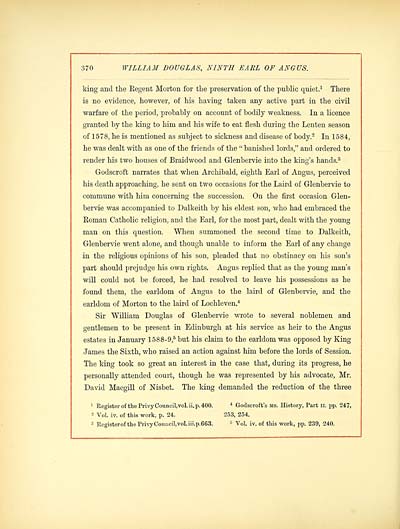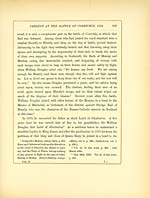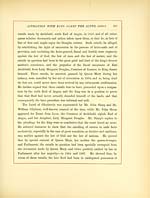Douglas book > Angus memoirs
(394) Page 370
Download files
Complete book:
Individual page:
Thumbnail gallery: Grid view | List view

370 WILLIAM DOUGLAS, NINTH EARL OF ANGUS.
king and the Kegent Morton for the preservation of the public quiet. 1 There
is no evidence, however, of his having taken any active part in the civil
warfare of the period, probably on account of bodily weakness. In a licence
granted by the king to him and his wife to eat flesh during the Lenten season
of 1578, he is mentioned as subject to sickness and disease of body. 2 In 1584,
he was dealt with as one of the friends of the " banished lords," and ordered to
render his two houses of Braidwood and Glenbervie into the king's hands. 3
Godscroft narrates that when Archibald, eighth Earl of Angus, perceived
his death approaching, he sent on two occasions for the Laird of Glenbervie to
commune with him concerning the succession. On the first occasion Glen-
bervie was accompanied to Dalkeith by his eldest son, who had embraced the
Eoman Catholic religion, and the Earl, for the most part, dealt with the young
man on this question. When summoned the second time to Dalkeith,
Glenbervie went alone, and though unable to inform the Earl of any change
in the religious opinions of his son, pleaded that no obstinacy on his son's
part should prejudge his own rights. Angus replied that as the young man's
will could not be forced, he had resolved to leave his possessions as he
found them, the earldom of Angus to the laird of Glenbervie, and the
earldom of Morton to the laird of Lochleven. 4
Sir William Douglas of Glenbervie wrote to several noblemen and
gentlemen to be present in Edinburgh at his service as heir to the Angus
estates in January 1588-9, 5 but his claim to the earldom was opposed by King-
James the Sixth, who raised an action against him before the lords of Session.
The king took so great an interest in the case that, during its progress, he
personally attended court, though he was represented by his advocate, Mr.
David Macgill of Nisbet. The king demanded the reduction of the three
1 Register of the Privy Council, vol. ii. p. 400. 4 G-odscroft's MS. History, Part n. pp. 247,
2 Vol. iv. of this work, p. 24. 253, 254.
3 Kegisterof the Privy Council, vol. iii.p.663. 5 Vol. iv. of this work, pp. 239, 240.
king and the Kegent Morton for the preservation of the public quiet. 1 There
is no evidence, however, of his having taken any active part in the civil
warfare of the period, probably on account of bodily weakness. In a licence
granted by the king to him and his wife to eat flesh during the Lenten season
of 1578, he is mentioned as subject to sickness and disease of body. 2 In 1584,
he was dealt with as one of the friends of the " banished lords," and ordered to
render his two houses of Braidwood and Glenbervie into the king's hands. 3
Godscroft narrates that when Archibald, eighth Earl of Angus, perceived
his death approaching, he sent on two occasions for the Laird of Glenbervie to
commune with him concerning the succession. On the first occasion Glen-
bervie was accompanied to Dalkeith by his eldest son, who had embraced the
Eoman Catholic religion, and the Earl, for the most part, dealt with the young
man on this question. When summoned the second time to Dalkeith,
Glenbervie went alone, and though unable to inform the Earl of any change
in the religious opinions of his son, pleaded that no obstinacy on his son's
part should prejudge his own rights. Angus replied that as the young man's
will could not be forced, he had resolved to leave his possessions as he
found them, the earldom of Angus to the laird of Glenbervie, and the
earldom of Morton to the laird of Lochleven. 4
Sir William Douglas of Glenbervie wrote to several noblemen and
gentlemen to be present in Edinburgh at his service as heir to the Angus
estates in January 1588-9, 5 but his claim to the earldom was opposed by King-
James the Sixth, who raised an action against him before the lords of Session.
The king took so great an interest in the case that, during its progress, he
personally attended court, though he was represented by his advocate, Mr.
David Macgill of Nisbet. The king demanded the reduction of the three
1 Register of the Privy Council, vol. ii. p. 400. 4 G-odscroft's MS. History, Part n. pp. 247,
2 Vol. iv. of this work, p. 24. 253, 254.
3 Kegisterof the Privy Council, vol. iii.p.663. 5 Vol. iv. of this work, pp. 239, 240.
Set display mode to:
![]() Universal Viewer |
Universal Viewer | ![]() Mirador |
Large image | Transcription
Mirador |
Large image | Transcription
Images and transcriptions on this page, including medium image downloads, may be used under the Creative Commons Attribution 4.0 International Licence unless otherwise stated. ![]()
| Histories of Scottish families > Douglas book > Angus memoirs > (394) Page 370 |
|---|
| Permanent URL | https://digital.nls.uk/96536522 |
|---|
| Attribution and copyright: |
|
|---|---|
| Description | A selection of almost 400 printed items relating to the history of Scottish families, mostly dating from the 19th and early 20th centuries. Includes memoirs, genealogies and clan histories, with a few produced by emigrant families. The earliest family history goes back to AD 916. |
|---|

